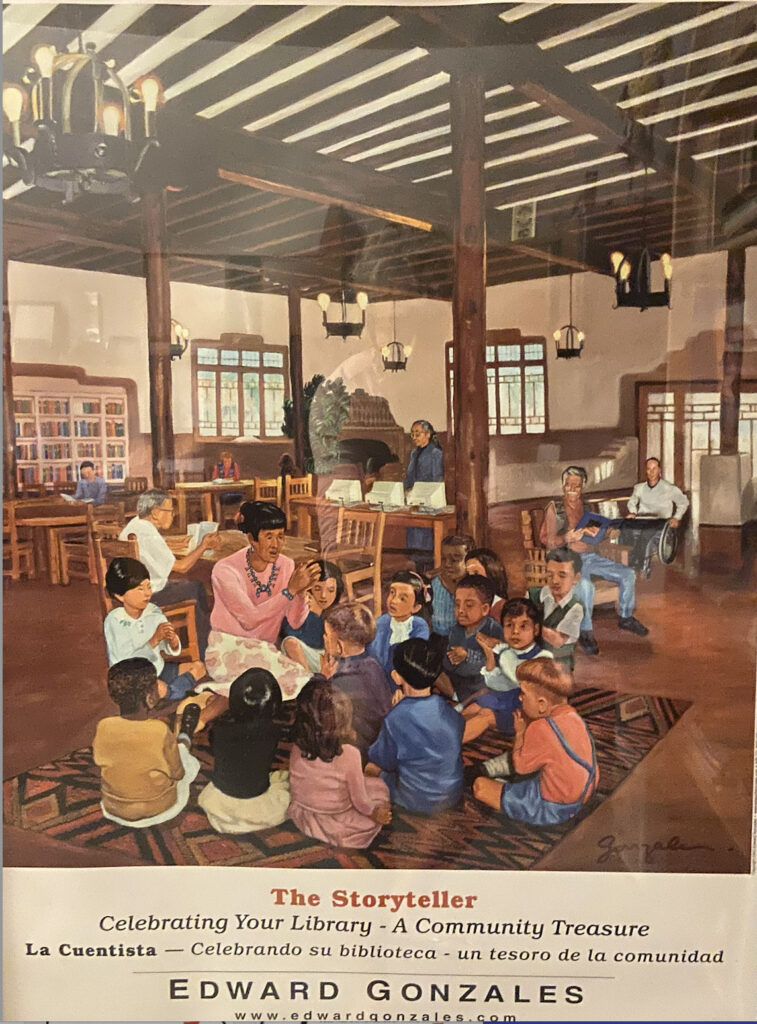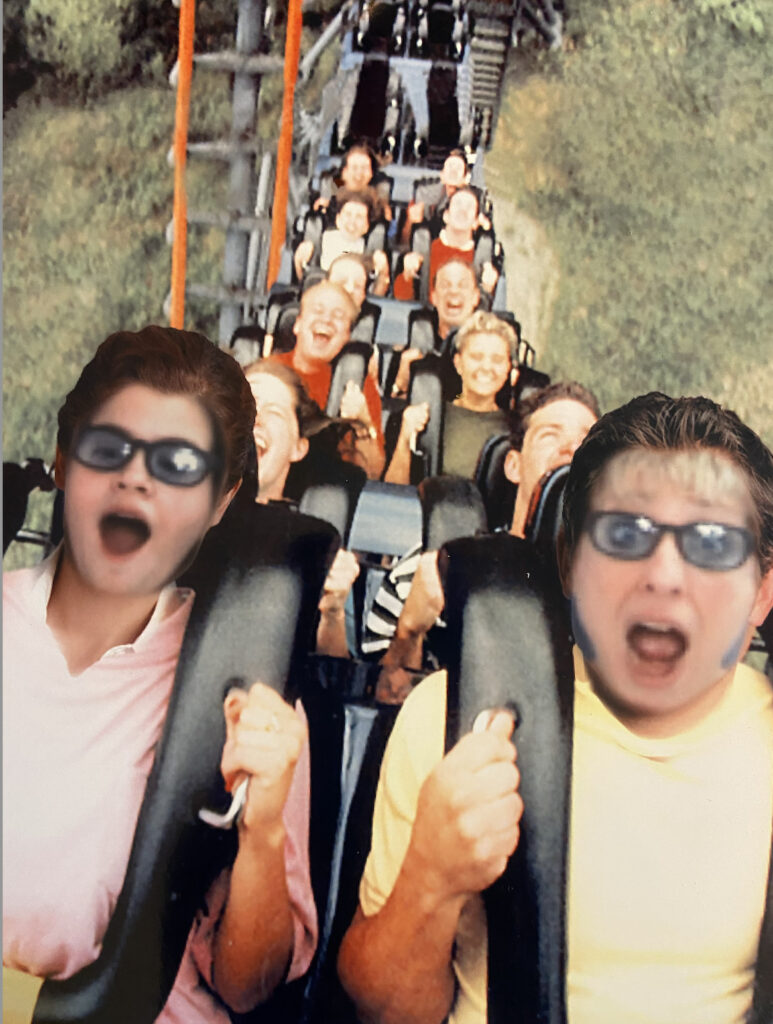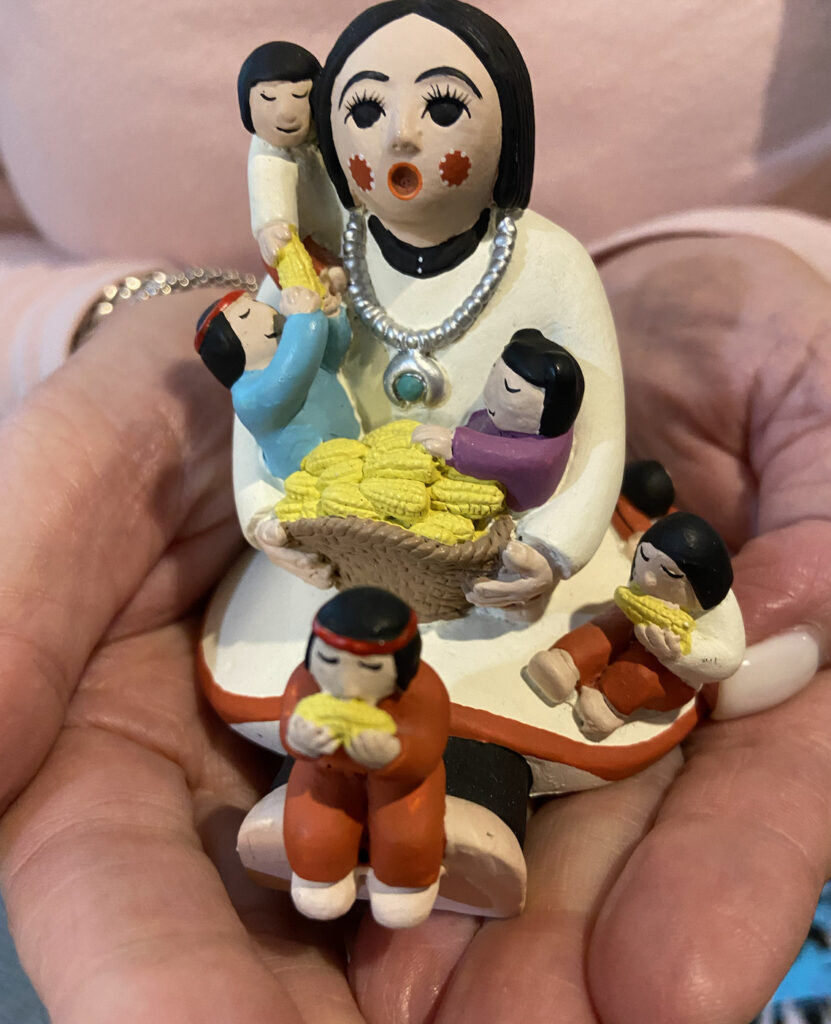I love sharing stories. That’s why I received a gift of a ‘storyteller poster’ which hangs in my office. And that’s why I continued to receive gifts relating to storytelling over the years.
Image by Lori Josephson

I used to talk with my students, all of whom had dyslexia to greater or lesser extents, about how they felt concerning going back to school. I used to ask my own kids, none of whom had dyslexia, how they felt too. These were always my parting words:
“There is only 1 time to make a first impression.”
Lori Josephson
And you, my dear readers, know when that is:
THE FIRST DAY OF SCHOOL!
That’s what I used to tell my own kids the night before school started and again in the morning, and that’s what I used to tell my tutoring students the last time I worked with them before school started.
Alarms were set, clothes laid out, lunches packed, backpacks labeled—everything clean and new.
Everyone was excited to see friends, meet up at the bus stop, take photos, and say goodbye to their parents for a good many hours. I know as much as kids want to be with their parents, they are glad ‘to be on their own’ too. And I truly believe that all kids want to learn and want to be successful.
I realize I am painting a picture that does not exist for all kids heading back to the classroom. And these less fortunate kids still have to show up on the first day of school, adding many layers to the already exciting, but for many, tense feelings associated with heading back to the classroom.
I often told kids that being a student was their ‘full time job’ and going to school was ‘the law’ (which it is). Imagine having a full-time job where success was often just plain out of reach…
SCHOOL IS LIKE A ROLLER COASTER

“School is like a roller coaster.”
Lori Josephson
This picture was taken about 20 years ago, actually at an event. That’s me on the right and that’s my young friend, Lilly, on the left. At the time, it was just a picture taken at the event, but this photo has been displayed front and center in my office as a symbol of what school “feels like” to so many students, especially those with learning, behavioral, and yes, family issues. These issues cut across all socioeconomic groups in society.
Roller coasters can feel….
exciting,
scary,
exhilarating,
nauseating,
like things are moving too fast, and
like things are moving too slow.
The list is endless, but you get the point.
Some of us can’t wait to ride a roller coaster, while others avoid the ride like the plague—and everything in between. That’s how going to school feels like for our kids. So, take a ride with some of my students and me.
HI, I’M LILLY
“I’m 7. I am very nervous and school is scary for me. I know I have trouble making sense of the words on the page. School seems so easy for others and it is so hard for me. The other kids’ journals have pictures and words–mine is mostly pictures and I don’t like my handwriting.. I read so slowly even when I try to read an easy book like Frog and Toad Are Friends.
My mom has a friend (that would be me, Lori!) who works with kids like me. My mom sent my journal to her friend since she lives in another state and also a recording of me reading Frog and Toad Are Friends. My mom’s friend helped my parents find a tutor after school near my home. I like working with my tutor, but learning to read and write seems to be so hard. I feel happy that my parents are getting me some extra help.”
“Some years have passed and I still go to my tutor. Things were a little better, but my challenges remain. I vividly remember crying and struggling late into the night when working on writing assignments when I was in 4th grade and all the way through middle school. It was so hard for me. I was so proud of myself when I was able to read articles from the New York Times.”
“High school is a better experience since my reading and writing have improved. My handwriting is better too, and I have extra time to take tests. Speaking of tests, I had to be ‘tested’ for many hours several times over the course of my schooling with a psychologist so that I qualified for extra time to take tests. It’s hard to sit still and be ‘tested’ repeatedly, but I do it. I feel more organized and had a better schedule during my high school years, which makes completing assignments far less stressful. I think I matured and feel much more comfortable in my own skin. What a relief to get off the roller coaster of school for a change.”
KEVIN’S STORY
“I’m 9 and I just finished second grade. I was held back in first grade. That means I did first grade twice. And I still can’t read or spell very well at all. The first time I went to my new tutor’s office, I was shaking like a leaf. The mother of another student told me, “Don’t worry, Mrs. J. will fix you up.” I doubted this statement, but it turned out to be true.”
“That’s how I feel about going to school, especially during ELA (English Language Arts). Being there makes my palms sweat and I feel like I am 2 inches tall. School isn’t all bad. I am a decent math student and I am really good at sports, so I love gym and recess. Gym and recess are my favorite ‘subjects’ for as long as I can remember. I like learning, so I like science and social studies. I just can’t read the textbooks. I have to learn by listening as best as I can. Making friends easily doesn’t hurt either.”

“During the summers, I always teach myself something new. One summer, I taught myself how to pick locks by watching YouTube videos. In 5th grade, I was the fastest kid in the entire grade at solving a Rubik’s Cube since I spent the summer working on it. It felt amazing!”
Image by Lori Josephson
“As my reading and spelling improve, I begin to notice other kids who need help to improve their reading, but they aren’t as lucky as I am since their parents don’t get them a tutor. I talk to my tutor about getting these kids help–my tutor told me these kids’ parents have to reach out to get help for their kids. Some did and others did not. My tutor tells me I had ‘empathy’ for others. That means I notice and imagine others’ feelings. She tells me that empathy is a good quality.
The last time I leave her office, I am reading and spelling just like other kids in my grade, but I still read kind of slowly. I’m not on an IEP anymore and I feel proud.”
I’M JOCELYN
“I’m 6 and I just know something is wrong with me. I can’t read anything except maybe my name. So I have an idea. I can just look at the words and ‘pretend’ to read. I can tell a good story and that’s just what I do when I am in school! There are pictures on the pages and I make it work, but I know what I am doing and I don’t feel good about it at all, especially when I listen to the other kids in the classroom. I can’t spell either, and I can hardly remember how to make the letters, especially those b’s and d’s. It’s all a jumble and it feels scary. I’m embarrassed and keep my eyes down as much as possible. I try to just ‘disappear’ as much as I can and maybe no one will notice what I can’t do in school. I have made a couple of friends, but I am not relaxed even when I am eating lunch. School feels hard.
My parents took me to an office to see if I have dyslexia. I can barely say that word. When I am asked to read a paragraph, there are no pictures, so again, I use my idea of just ‘pretending’ to read…but I know I am ‘found out’ since I cannot use the pictures to help me. When I am asked to spell some words and write a sentence about a picture, I just make up the words and the letters. When I am asked to read what I write, I just make that up too. I have to sit there for what seems like a very long time and I am hardly able to complete any of the things I am asked to do. I have trouble hearing sounds in words and also knowing what sounds the letters stand for. My parents find out I have dyslexia and everyone is kind of scared. My dad has dyslexia and he really doesn’t want to talk about it.”
“I start to work with a tutor and my mother works so hard with me to help me finish my homework and study for tests. Maybe by second or third grade, I got tested in school and got on an IEP, so I’m ‘supposed’ to get extra time and additional help in school. I got another tutor, and I can tell you that it was my second and final tutor who taught me to read, write, and spell. My ‘help’ in school was using an online program, which I really hated.
My friends in middle school who would say things like, “You can’t spell ______?” really hurt me. It made me feel really small, but I shrug it off in front of these ‘friends’.
As I make my way through middle and high school, my reading, writing, typing, and spelling improved, and with that, my self-esteem. I learn how to organize myself–my materials, my laptop, my time, my study habits. I start projects far in advance to avoid any last minute emergencies and I become proactive. If I need help, I ask my mom, my tutor, and sometimes my teachers. If I don’t get the extra time to finish tests, I speak to the teachers and/or other school staff to get that extra time. I still read slowly, so I read my textbooks while listening to them. I make time to become involved in extracurricular activities, including tennis (because the season started before school and would not interfere with the harder part of the school year) and student government. I go on to receive 3 scholarships at high school graduation. Yes, it is challenging. Yes, I still feel anxious at times, but I have learned to live with my dyslexia as opposed to fighting it. Dyslexia runs in my family, and the adults in my family hold jobs, have families, and are as happy as anyone else.”

THE TAKEAWAYS..
Let me fill you in on what these students have achieved so far:
- Lilly completed her undergraduate education in 4 years, obtaining a degree in Women’s Studies. She went on to complete Pre-Medical School requirements after spending a year teaching English to students in Thailand. Lilly did so well that she became a teaching assistant. She completed medical school in 4 years (the typical time frame), is now an MD, and is completing her training in Rehabilitative Medicine. I’ve had the pleasure of knowing Lilly every step of the way since her mom and I are lifelong friends. My heart is bursting with pride and joy as I think of Lilly’s successes.
- Kevin is an entering senior in college and will complete his degree in 2024 with a degree in Engineering. He is also a ROTC student and will complete his time serving the military. Kevin has the charisma of a politician; he will go far in this world.
- Jocelyn is an entering junior in college and will complete her degree in 2025 with a degree in Business. Her specializations are in finance and insurance. She tells me she uses the Writing Center at her university when needed and prides herself on organizing her time. I recently met up with her and one of our topics of conversation was setting up her off campus apartment and sharing recipes with her roommates. It was a delightful afternoon with a mature young woman.
I share these stories about real people who experienced real feelings as part of their dyslexia journey. They all persevered and developed necessary resiliency. I share these stories at this time of the year because I want readers to know:
- how struggling students, dyslexic or not, feel when faced with the responsibilities of attending school (it is a child’s full-time job). I want you to be aware of how anxiety provoking the school environment can be.
- how exhausting it can be to be the parent or caregiver of these students. Late afternoon and late night meltdowns, homework completions, and study sessions are stressful and exhausting for parents of these students, as well as the students themselves. Not one of these parents escaped these feelings of helplessness at times, even though these parents sought private evaluations and all of their children had professional assistance in addition to what their schools provided. I want you to imagine the parents of struggling children who do not have the means to seek private support. The numbers are vast, as up to approximately 15 to up to 20% of students in any classroom fall under the continuum diagnosis of dyslexia, not to mention the effects of learning loss due to Covid-19.
- how much more exhausting it is for parents who themselves struggled with similar issues to see and aid their children who now struggle.
I read and hear about students with academic issues who feel traumatized and plagued with anxiety issues. As Sally Shaywitz asserts in her book Overcoming Dyslexia, “for many affected children, dyslexia has extinguished the joys of childhood.”
Below are several links that may be of interest and assistance. Parents, teachers, and administrators, you want to do everything in your power to maintain the self-esteem of and foster resiliency in our next generation as they head back to the classroom.
Social and Emotional Problems Related to Dyslexia from The International Dyslexia Association
The Overlooked Comorbidities of Dyslexia: Approaches to Whole-Child Remediation from Learning Ally
What Protective Factors Lead to Resilience in Students with Dyslexia? from The International Dyslexia Association
Parenting a Child with Dyslexia: A Mom Shares Her Story from The National Center for Learning Disabilities
I invite you to share your story. Feel free to reach out to me. I want to hear from you!

Admiring the time and energy you put into your website and in depth information you present.
It’s nice to come across a blog every once in a while that isn’t the same old rehashed material.
Great read! I’ve saved your site and I’m adding your RSS feeds to
my Google account.
Thank you! Keep reading.
You really make it seem so easy with your presentation but
I find this topic to be actually something that I
think I would never understand. It seems too complicated and very broad for me.
I’m looking forward for your next post, I’ll try to get the hang of it!
Thank you, keep reading!!
You are most welcome. Keep reading!
Lori